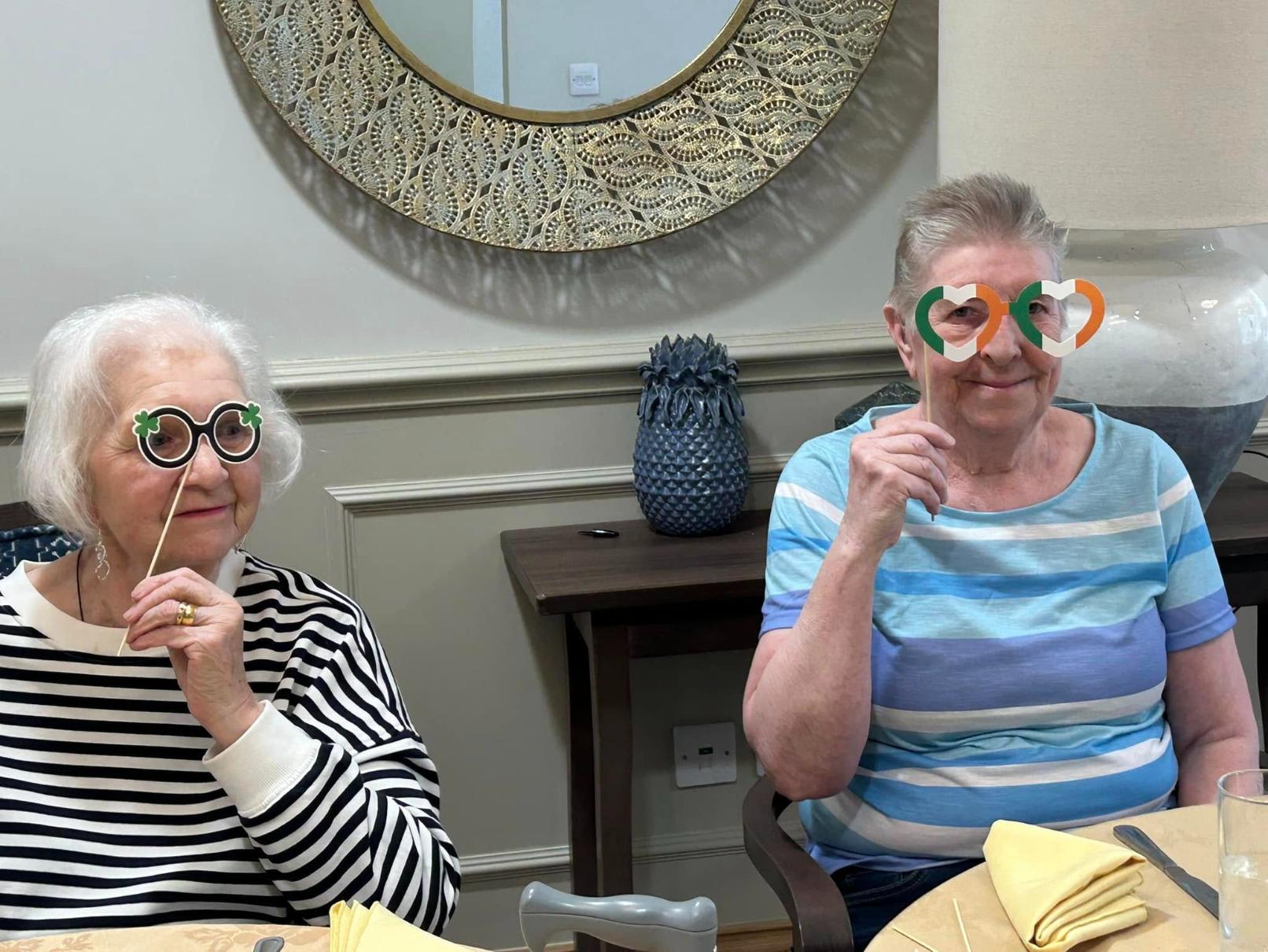When Should Someone With Dementia Go Into a Care Home?

Knowing when a family member's dementia has progressed to a stage where moving into a care home is the best option can be very difficult to determine for many reasons.
Dementia is a progressive neurological condition that commonly affects individuals aged 65 and above, resulting in diminished mental capacity and often challenges with thinking, reasoning, behaviour and communication. Given the diverse types of dementia, it becomes vital to understand the specific kind of specialised care that may be required for a person living with dementia.
Within this blog, we will explore the different factors that need to be considered when determining whether a person living with dementia should transition to a care home. Additionally, we offer guidance on how to identify the right care home as and when this move becomes necessary.

When Should Someone With Dementia Go Into a Care Home?
When An Individual's Home is No Longer the Safest Place
One of the primary things to consider when trying to find the right care home for an individual living with dementia is whether their current living environment remains safe for them. As dementia advances progressively, it can lead to disorientation and confusion, increasing the risk of accidents and making it difficult for a person to live independently and carry out basic chores. Tasks that might seem routine, such as switching off the gas or locking doors, can be easily overlooked, potentially exposing them to harm and even causing them to go to the hospital.
To ensure the safety of the person living with dementia, transitioning to a care home may be the best choice. Whether it's a nursing home or an all-inclusive care home, these establishments typically provide dementia care in a dedicated dementia unit. Within these care facilities, an experienced team is available to provide around-the-clock care. While prioritising residents' safety, care homes will offer a supportive environment that allows individuals with dementia to continue to have a degree of independence whilst living in a secure environment.
Becoming Withdrawn and Isolated
People with dementia often encounter social isolation. This can be because of the limited social interactions as leaving the house becomes more daunting and the safety risks increase such as driving a car, due to a decline in cognitive function. As a result, managing daily life without additional support becomes increasingly challenging.
Choosing to reside in a care home or nursing home can help to reduce isolation for someone with dementia. Within these settings, engaging in social interaction can be a daily occurrence while receiving the specialised care a person requires. This not only positively impacts their mental well-being and cognitive abilities, but it also restores the ability to rediscover joy in their daily lives.
The involvement of friends and family in the care home selection process remains crucial. Regular visits from loved ones help maintain connections and relationships, promoting a sense of familiarity and emotional well-being for individuals with dementia.
Caregivers at Home Struggling to Provide Support
Being a caregiver for someone with Dementia can be a demanding responsibility. As dementia progresses to its later stages, the support needed might turn into a full-time commitment and an uphill battle can potentially lead to burnout and exhaustion which both could hinder the ability to adequately meet their needs. This not only affects a carer's well-being but also impacts the well-being of the person being cared for.
Dementia care homes offer a range of facilities designed to enhance the lives of individuals with dementia. These include sensory rooms and activities geared towards reminiscence, all within a communal living environment with like-minded individuals. With the comprehensive support provided by dementia specialists, family members and loved ones can visit residents and spend quality time together, free from concerns about providing care. This arrangement allows for a more fulfilling and less burdened experience for all parties involved.
Finances and Dementia
The escalating cost of living in the United Kingdom is a matter of concern for numerous individuals, particularly those people with dementia. Such individuals may find it challenging to grasp the escalating expenses and might experience heightened financial anxiety.

Opting to live in a residential, all-inclusive or nursing care home can offer a measure of relief, enabling individuals to maintain their preferred lifestyle without having to worry about rising costs. These care establishments typically encompass daily living expenditures such as heating, electricity, food and maintenance within a care package. With a fixed fee structure in place, residents are spared the worry of fluctuating bills every month. Generally, individuals with dementia are responsible for self-funding their care home fees with the support of loved ones, which are usually paid on a weekly or monthly basis but some may be eligible for financial help.
It's crucial to acknowledge that the cost of care homes can be substantial. For those unable to independently cover these expenses, several avenues exist to secure financial support. The local authority frequently provides funding based on how much an individual has in assets and savings, including property. To acquire local authority funding, a financial assessment is carried out which is known as a means test. Another potential avenue is NHS continuing healthcare, where a multi-disciplinary team undertakes numerous assessments to determine an individual's eligibility for full financial aid is they have a 'primary health need'.
Speaking to a Professional About a Move into a Care Home
If you hold the power of attorney for someone with dementia, reaching out to a medical professional, such as a nurse, GP or social worker may be the first step. These professionals are equipped to evaluate the situation offering guidance on the most suitable course of action going forward.
Navigating life with dementia presents an ongoing challenge even in the early stages and seeking advice from social workers or experts can bring a sense of reassurance. If you're seeking guidance on a dementia care plan for your loved one, we recommend contacting specific care homes as this ensures you're equipped with the information you need. It is important to arrange visits to a number of care homes for comparisons to help you make the right decision for all involved.

Finding an Appropriate Care Home or Nursing Home
It is crucial to find a suitable care home that can enhance a person's quality of life. As Dementia progresses, completing everyday tasks becomes progressively challenging. Care homes and nursing homes can provide 24-hour support which often means for most, moving to a care home becomes the preferred option.
Various types of care homes offer dementia care for individuals with dementia, including nursing homes, residential care homes and all-inclusive care homes. Some care homes specialise in specific types of care, whereas other care homes provide multiple care services where residents can receive a continuum of care as and when care needs change.
Every care home presents its selling points but it is important to conduct your research to work out which home is best for your family member or loved one. Below, we outline the key factors that we believe are essential when seeking the ideal care home."
Finding a Home Away From Home
As dementia progresses, the idea of moving into a care home can be quite overwhelming, particularly due to unfamiliar surroundings. When assessing potential care homes, it's important to ascertain whether residents have the option of having their own room. This choice provides them with the freedom to personalise their living space and make it their own.


In terms of on-site amenities, we recommend looking for facilities with reminiscence rooms or sensory rooms within their dementia floor or unit, as these can significantly support the cognitive abilities and mental health of those living with dementia. It's crucial to find a care home that not only addresses an individual's personal care needs but also supports overall well-being.
Involving the Person in Decision-Making
If you are seeking dementia care for a loved one, effective communication between you and the person with dementia is important, considering they will be the ones directly affected by the change. It's crucial to provide clear explanations using simple language and to reassure them that their loved ones will visit regularly. Given the isolating nature of dementia, it's essential to explain the positive aspects of a care home and provide them with the opportunity to ask questions.
If suitable, it might be advisable for a family member of the person living with dementia to obtain lasting power of attorney if that person lacks mental capacity. This legal document grants you the legal power to make decisions by acting on your behalf if they are unable to do so. You can acquire lasting power of attorney at any stage of the condition.
Finding a Care Home That Can Meet Their Needs
When moving to a care home, it's vital to make sure that they offer the right care for your loved one's needs. It's important to share personal details about your family member's medical background, any prescribed medications and daily habits with the care home manager. This is necessary as it enables them to comprehend and address their distinct needs. Subsequently, the care home staff will conduct an evaluation of needs to create a customised dementia care plan and routinely review the resident's needs to guarantee effective and accurate care throughout their stay.

Choosing the appropriate care home involves understanding the distinct requirements of the individual with dementia to ensure that they obtain an improved quality of life. Seeking out a care home with a specialist dementia team will provide peace of mind as they will be able to properly support your loved one when their dementia progresses. Additionally, it is important to take into account factors such as location, expenses and the quality of services provided by the care home before making a final decision.
Relocating a family member to a care home can be emotionally challenging, but it is important to remember that you're not on your own. We would always advise you to speak to professional healthcare experts such as a GP, qualified nurse or social worker who can steer you through the process and address any worries you might have about establishing the best care approach.
There are many online resources and charitable organisations like Age UK and the Alzheimer's Society that offer guidance, information and support on their website or helpline. Any decisions tailored to a particular care home should be discussed with the care home manager.



Tailored Dementia Care in Oxfordshire
We are proud to provide dementia care at our care home in Didcot, alongside residential care, nursing care, respite care and palliative care. Our dedicated dementia unit has been created with the well-being of our residents living with dementia as a top priority, meaning changing care homes is not necessary - you have a home for life with us. Our goal is to provide residents with a secure and pleasant living environment. To achieve this, we have a dedicated and highly skilled team who can support individuals at different stages of their dementia journey. The Valerian Court dementia team has undergone comprehensive training, ensuring they possess the expertise necessary to address the diverse symptoms associated with dementia. This provides our residents with the ability to lead fulfilling and meaningful lives.
We take pride in offering facilities that cater to the unique needs of our dementia residents. Working in collaboration with healthcare professionals, our Activity Coordinators develop a tailored programme that maximises the benefits for our residents. This programme incorporates a variety of engaging activities offered on a daily basis. Our firsthand experience has shown that consistent participation in activities can enhance cognitive functions, provide mental stimulation, boost social skills and enhance self-confidence.
At Valerian Court, our dedicated and caring team consistently goes the extra mile to ensure that our residents with dementia receive unwavering support and the utmost respect around the clock. Through the consistent provision of care and engaging activities designed to alleviate the challenges posed by dementia, our residents are empowered to rebuild their confidence and embrace life with a renewed sense of independence.
Find Out More About Valerian Court Care Home
If you would like to find out more about the dementia care services that we provide to our care home in Oxfordshire, get in contact with our friendly team today.






